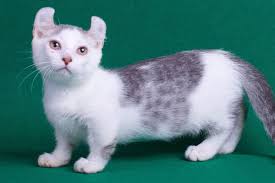
Kinkalow
Conditions of detention
Kinkalows thrive in indoor environments where they have plenty of space to explore and play. They enjoy interactive play and benefit from having toys and climbing structures to engage their active and curious nature.
Useful Fact:
Kinkalows are highly social and enjoy spending time with their human companions. They are known for their playful and affectionate nature, making them excellent companions for families and individuals alike.
Nutrition and diet
Kinkalows require a balanced diet consisting of high-quality cat food rich in proteins, fats, vitamins, and minerals to support their active lifestyle and overall health. Fresh water should always be available, and portion control is important to prevent obesity.
Useful Fact: Kinkalows benefit from a diet that includes both dry and wet food to ensure they receive adequate hydration and support dental health.
Health
Kinkalows are generally healthy, but regular veterinary check-ups, vaccinations, and preventative care are essential. They should be monitored for common feline issues such as dental disease and obesity, and potential skeletal issues due to their short legs.
Useful Fact: Kinkalows inherit genetic traits from both parent breeds, so it’s important to choose a breeder who tests for common hereditary conditions.
Grooming and care
Kinkalows have moderate grooming needs. Their coat should be brushed weekly to prevent matting and reduce shedding. Regular nail trimming, ear cleaning, and dental care should also be part of their grooming routine.
Useful Fact: Due to their unique ear structure, Kinkalows may require more frequent ear cleaning to prevent infections.
Education and training
Kinkalows are intelligent and can be trained using positive reinforcement techniques. They can learn tricks, use a litter box efficiently, and follow basic commands with consistency and patience.
Useful Fact: Kinkalows enjoy interactive training sessions that challenge their minds and can often be taught to perform a variety of tricks.
Toys and entertainment
Interactive toys, puzzle feeders, and climbing structures are ideal for keeping Kinkalows entertained. Providing a variety of toys helps to stimulate their active minds and prevent boredom.
Useful Fact: Kinkalows, due to their playful nature, particularly enjoy toys that mimic the movements of prey, such as feather wands and laser pointers.
Safety
Indoor living is recommended for Kinkalows to protect them from outdoor hazards such as traffic, predators, and diseases. Ensure windows and balconies are secure to prevent accidents.
Useful Fact: Kinkalows are agile and curious, despite their short legs, so providing safe indoor climbing spaces can help satisfy their adventurous spirit.
Accessories
Essential accessories for a Kinkalow include a sturdy scratching post, comfortable bedding, litter boxes, and grooming tools. Interactive toys and climbing trees are also beneficial for their physical and mental stimulation.
Useful Fact: Providing a variety of textures and materials in their accessories can keep Kinkalows engaged and prevent boredom.
Socialization
Kinkalows are naturally sociable and thrive on interaction with their human families and other pets. Early socialization helps them develop into well-adjusted adults who are comfortable in various environments.
Useful Fact: Kinkalows often form strong bonds with their owners and other pets, making them excellent companions in multi-pet households.
Travel and Transportation
Kinkalows can adapt to travel if introduced gradually. Using a secure carrier and providing familiar items like a blanket or toy can help reduce travel-related stress.
Useful Fact: Some Kinkalows enjoy exploring new environments and can be trained to walk on a leash, making them good travel companions.
Behavior and psychology
Kinkalows are affectionate, playful, and inquisitive cats. They are known for their loyalty and strong bonds with their owners, often displaying dog-like behavior in their interactions.
Useful Fact: Kinkalows can be quite vocal and expressive, using a variety of sounds to communicate their needs and feelings to their owners.
Legal aspects
Before acquiring a Kinkalow, check local regulations regarding pet ownership, including licensing and microchipping requirements. Adherence to responsible breeding practices and animal welfare laws is also important.
Useful Fact: Kinkalows are recognized by several major cat registries, which helps ensure breed standards and responsible breeding practices are maintained.


